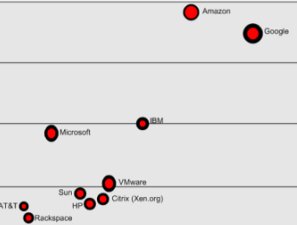Open source and the Google cloud


(Shown to the right is a detail from a chart Dave Rosenberg took from Evans Data last year, showing the relative strengths of cloud vendors in the completeness of their solutions and ability to execute.)
Google has achieved such economies of scale in delivering transactions and storage that competing with them over the long run looks foolish.
Unless you have a breakthrough that can balance out those cost disadvantages you're really at their mercy. If Google decides to "embrace and extend" its cloud dominance into software and services you're going to lose.
Except for the last mile, the phone companies and cable companies are truly obsolete. Google remains nowhere on clients but that's changing, and its thinner clients look like the wave of the future.
It's Google's world, in other words. Open source just lives in it.
This does not mean the situation is hopeless. Google's success is, ironically, driven as much by its lack of ruthlessness as it is by its scale. If Google were seeking to aggressively capitalize on its advantages, the pushback would be fiercer and everyone's growth (including Google's) slower.
This is important. Look at how monopolies throughout tech history have slowed market progress over the years. It's not because the monopolies were not natural, but because their holders sought to capitalize on those advantages.
See IBM, the phone companies and Microsoft for examples. Heck, see Oracle. Compare their behavior, as monopolists, to the way Google acts today, and the market growth resulting from the two approaches.
Don't be evil is good for everyone. It means that Google can compete with governments and hold its own, not just other corporations. Aren't you glad they're on our side?
But, as Jason Perlow notes today, with great power comes great responsibility. And great opportunity for anyone who can help meet it.
Security, for instance. There are now procedures that go far beyond what client software can do, in terms of assuring that bad code is detected and quickly neutralized. Network stacks for security monitoring are coming, and Google could use help there.
The same is true for applications, especially those that connect enterprises to the cloud's economies of scale. If you have high value-add applications, you can help overcome some of Google's advantages and make other clouds profitable.
It's important at this point to note that Google's code is not copyleft. It supports the Apache license, which is compatible with GPLV3 but not with GPLV2. Google understands the need to provide opportunity for software beneath its cloud layer, and for ongoing help in maintaining the cloud.
What this means is you can become part of Google's ecosystem, enabling it, or you can try the harder path of helping people compete with it, overcoming their cost disadvantage in some way.
Best of all, open source retains its advantages in this new world. They even grow. Cooperation brings more man-hours to a project than selfishness does.
Managing this new environment is a challenge, but every new era brings big new challenges to IT. The Google era is going to be no different.